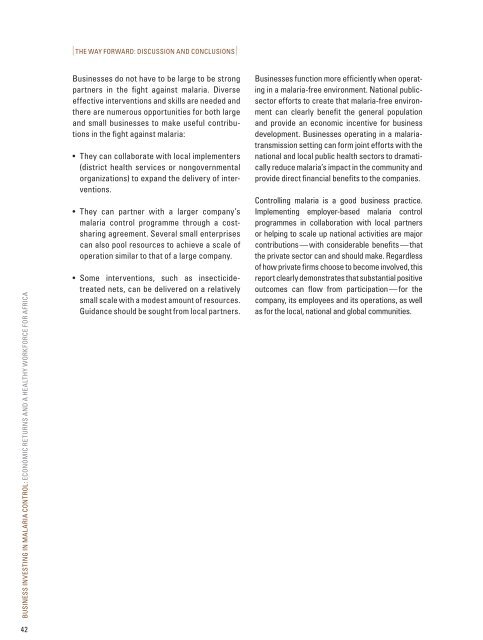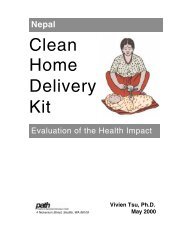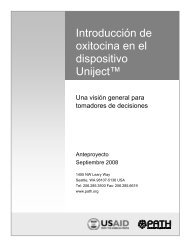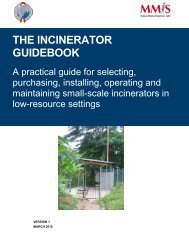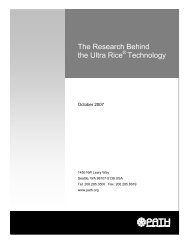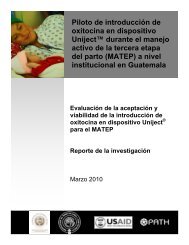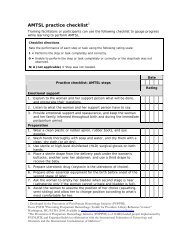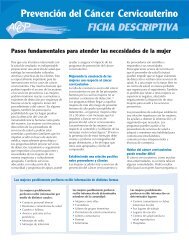Business Investing in Malaria Control: Economic Returns and ... - Path
Business Investing in Malaria Control: Economic Returns and ... - Path
Business Investing in Malaria Control: Economic Returns and ... - Path
Create successful ePaper yourself
Turn your PDF publications into a flip-book with our unique Google optimized e-Paper software.
| THE WAY FORWARD: DISCUSSION AND CONCLUSIONS |<br />
BUSINESS INVESTING IN MALARIA CONTROL: ECONOMIC RETURNS AND A HEALTHY WORKFORCE FOR AFRICA<br />
42<br />
<strong>Bus<strong>in</strong>ess</strong>es do not have to be large to be strong<br />
partners <strong>in</strong> the fight aga<strong>in</strong>st malaria. Diverse<br />
effective <strong>in</strong>terventions <strong>and</strong> skills are needed <strong>and</strong><br />
there are numerous opportunities for both large<br />
<strong>and</strong> small bus<strong>in</strong>esses to make useful contributions<br />
<strong>in</strong> the fight aga<strong>in</strong>st malaria:<br />
• They can collaborate with local implementers<br />
(district health services or nongovernmental<br />
organizations) to exp<strong>and</strong> the delivery of <strong>in</strong>terventions.<br />
• They can partner with a larger company’s<br />
malaria control programme through a costshar<strong>in</strong>g<br />
agreement. Several small enterprises<br />
can also pool resources to achieve a scale of<br />
operation similar to that of a large company.<br />
• Some <strong>in</strong>terventions, such as <strong>in</strong>secticidetreated<br />
nets, can be delivered on a relatively<br />
small scale with a modest amount of resources.<br />
Guidance should be sought from local partners.<br />
<strong>Bus<strong>in</strong>ess</strong>es function more efficiently when operat<strong>in</strong>g<br />
<strong>in</strong> a malaria-free environment. National publicsector<br />
efforts to create that malaria-free environment<br />
can clearly benefit the general population<br />
<strong>and</strong> provide an economic <strong>in</strong>centive for bus<strong>in</strong>ess<br />
development. <strong>Bus<strong>in</strong>ess</strong>es operat<strong>in</strong>g <strong>in</strong> a malariatransmission<br />
sett<strong>in</strong>g can form jo<strong>in</strong>t efforts with the<br />
national <strong>and</strong> local public health sectors to dramatically<br />
reduce malaria’s impact <strong>in</strong> the community <strong>and</strong><br />
provide direct f<strong>in</strong>ancial benefits to the companies.<br />
<strong>Control</strong>l<strong>in</strong>g malaria is a good bus<strong>in</strong>ess practice.<br />
Implement<strong>in</strong>g employer-based malaria control<br />
programmes <strong>in</strong> collaboration with local partners<br />
or help<strong>in</strong>g to scale up national activities are major<br />
contributions — with considerable benefits — that<br />
the private sector can <strong>and</strong> should make. Regardless<br />
of how private firms choose to become <strong>in</strong>volved, this<br />
report clearly demonstrates that substantial positive<br />
outcomes can flow from participation — for the<br />
company, its employees <strong>and</strong> its operations, as well<br />
as for the local, national <strong>and</strong> global communities.


